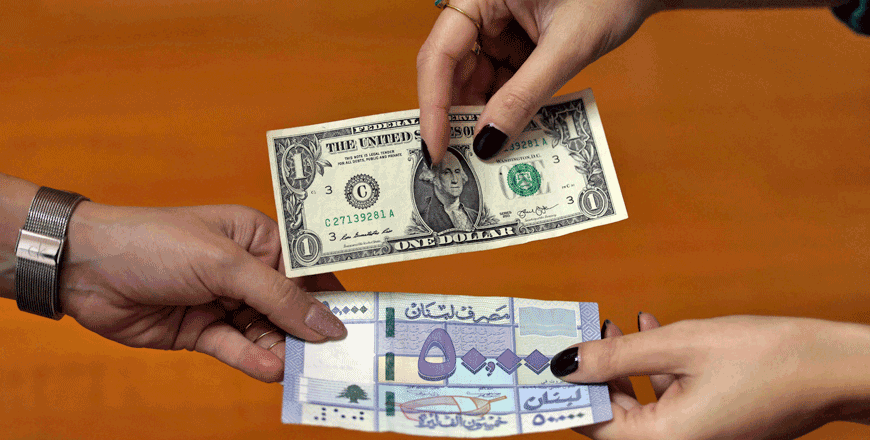You are here
Lebanese pound hits historic low of 100,000 to dollar
By AFP - Mar 14,2023 - Last updated at Mar 14,2023

In this file photo taken on January 19, 2023 two women exchange a one US dollar bill against a 50 thousand Lebanese pound (lira) banknote, in Beirut (AFP photo)
BEIRUT — The Lebanese pound sank to a historic low against the dollar on the parallel market on Tuesday, the latest sombre milestone in an economic meltdown that has plunged most of the population into poverty.
Officially pegged at 15,000 to the dollar, the pound was trading at 100,000 against the greenback, dealers said — a dizzying plunge from 1,507 before the economic crisis hit in 2019.
The currency's market value was at around 60,000 to the dollar in late January.
The currency plunge has triggered price hikes including on fuel, food and other basic goods, with supermarkets this month starting to price items in dollars.
Despite the gravity of the crisis, the political elite, which has been widely blamed for the country's financial collapse, has failed to take action.
Since last year, the country has had no president and only a caretaker government, amid persistent deadlock between rival factions.
"The lira has become completely worthless," said 75-year-old Abu Abbas, who owns a small jewellery stall on Beirut's busy Hamra Street and said he was barely making ends meet.
"I used to buy medicine for my wife for 40,000 pounds, now it costs 900,000," he told AFP.
Banks on strike
Lebanese banks, which have imposed draconian withdrawal restrictions — essentially locking depositors out of their life savings — were closed on Tuesday as they resumed an open-ended strike.
The strike began early last month to protest what the Association of Banks in Lebanon described as "arbitrary" judicial measures against lenders, after depositors filed lawsuits to retrieve savings.
Some judges sought to seize the funds of bank directors or board members, or to force lenders to pay out customers' dollar deposits in pounds at the old 1,507 exchange rate.
Customers had a two-week reprieve from the strike after caretaker Prime Minister Najib Mikati intervened late last month to impede the work of one of the judges investigating banks.
Withdrawal limits have sparked public outrage that has seen some Lebanese resort to armed hold-ups in a bid to lay hands on their own money.
The facades of many banks in the capital are almost unrecognisable from the outside, covered in protective metal panels, while ATMs have been vandalised.
"Ruling politicians... robbed the country and stole depositors' money," said Mohammad Al Rayes, a Beirut shopkeeper.
"They should leave and bring new leaders," the 65-year-old told AFP, adding: "Very tough times are coming."
'Loss of confidence'
Political inaction and a lack of accountability has been a hallmark of the Lebanese economic crisis, dubbed by the World Bank as one of the planet's worst in recent history.
In April last year, the International Monetary Fund announced an agreement in principle to provide Beirut with $3 billion in loans spread over four years — conditional on a package of sweeping reforms.
But officials have failed to enact the changes demanded by international creditors in return for unlocking the emergency loans.
Central bank governor Riad Salameh is being investigated at home and abroad for the suspected embezzlement of hundreds of millions of dollars.
A Lebanese judge has asked Salameh to appear before visiting European investigators on Wednesday as part of a multinational probe into his personal wealth.
Lebanon is facing the economic meltdown largely leaderless, as the divided parliament has failed to elect a new president for months — in a country already governed by a caretaker cabinet with limited powers.
Repeated sessions convened to elect a successor to Michel Aoun, whose term ended in October last year, have all failed to reach agreement on a consensus candidate.
The pound's steady downfall reflects a "total loss of confidence in the policy makers of the country", said Saeb El-Zein, a Lebanese former banker who worked with international lenders.
"You need political leadership to have economic leadership — and we don't have political leadership," he told AFP.
Related Articles
BEIRUT — Security forces in crisis-hit Lebanon’s capital fired tear gas on Wednesday at a protest against deteriorating living conditions, a
BEIRUT — Lebanon from Wednesday will shift its long-standing official exchange rate to 15,000 pounds against the dollar, a central bank sour
BEIRUT — Lebanon's central bank on Sunday announced a "conditional" plan that would allow depositors, hit by strangling financial restrictio


















